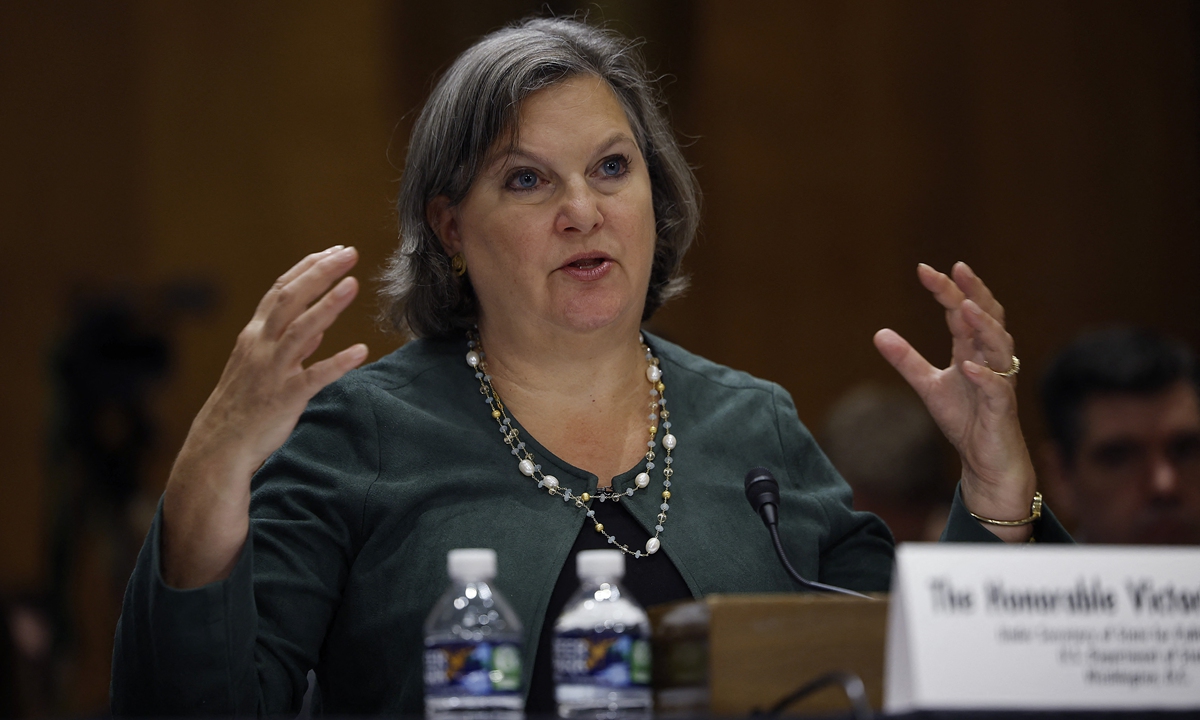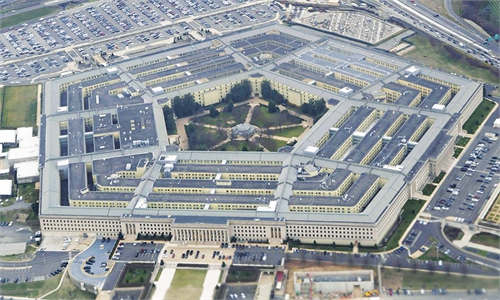
Undersecretary of State for Political Affairs Victoria Nuland. Photo:AFP
Victoria Nuland, the third-highest ranking US diplomat, will retire and leave her post this month, the State Department said Tuesday. Nuland has been a frequent target of criticism for her hawkish views on Russia and its actions in Ukraine.
Throughout her tenure in the Biden administration, Nuland played an aggressive role, serving as a "henchman" or "mouthpiece" embodying the Biden administration's hardline policy toward Russia. Nuland's stepping down reflects, to some extent, a change in the Biden administration's policy toward Russia. As Russian Foreign Ministry spokeswoman Maria Zakharova said on Tuesday, "Russophobia, proposed by Victoria Nuland as the main foreign policy concept of the US, is dragging the Democrats to the bottom like a stone."
Analysts believe Biden's tough policy against Russia has failed. The Russia-Ukraine conflict has entered its third year. The US and the EU have continuously escalated sanctions against Russia. However, these sanction measures have not completely achieved the Biden administration's goal of weakening Russia, leading to various debates within the US about the effectiveness of the policy. The war has only left Ukraine fragmented, weakened the EU and complicated transatlantic relations. The consequences of the sanctions against Russia have fallen more heavily on the US' European allies, with the European economy continuing to struggle. Many European countries have begun to reflect on and show a more cautious attitude toward the "America First" policy.
Currently, as the Russia-Ukraine conflict continues, on one hand, the US is aware of the losses it has suffered in the conflict; on the other hand, the US is increasingly struggling to provide aid to support Ukraine, Zhang Tengjun, deputy director of the Department for Asia-Pacific Studies at the China Institute of International Studies, told the Global Times. Faced with strong opposition and questioning from Republicans, the Biden administration is finding it difficult to advance aid to Ukraine. However, the strategic importance of the Asia-Pacific region is one of the few aspects on which both parties in the US have reached a consensus, making it easier to advance, Zhang added.
The appointment of "China expert" Kurt Campbell as the second-highest ranking at the State Department confirms that the future focus of the Biden administration will be on confronting China. Campbell's appointment reflects the Biden administration's continued shift toward what he calls the "Indo-Pacific region."
Nuland stated in February that the US wants "a partner that was going to be westernizing, that was going to be European. But that's not what Putin has done." This statement actually exposes the true thoughts of the US toward Russia over the long term - to turn Russia into a follower of the US and Western democracy. Interestingly, the current US fear of China and Russia has some similarities. US politicians have long sought to transform China into a country like the US. They question China's development model and path and provoke so-called value struggles, reflecting the US' intention to try to assimilate "unruly" countries in terms of ideology and values.
This is also the long-term strategic intent of the US as a global hegemony to reshape the world, especially those countries that have different political systems from the US'. And this intent, just like the failure of the anti-Russia policy with Nuland's departure, will lead to the same outcome of the anti-China policy being just a different version of the same approach.
The US maintains a Cold War mentality, attempting to suppress its competitors in order to maintain its global hegemony. However, this approach is completely wrong, as the US fails to recognize that the current era is completely different from the time of the US-Soviet Cold War confrontation, said Zhang.
The common vision of the international community is to achieve multipolarization, abandon great power competition, bloc politics and camp confrontation, and follow the path of cooperation, peaceful coexistence and mutual benefit. In recent years, various actions by the US have made the international community, especially countries in the Asia-Pacific region, become increasingly aware of the US strategic shift toward the Asia-Pacific to counter China. Taking sides does not serve their interests, and relying on the US to contain China is also a dead end. The US' attempts at containing China will ultimately fail.
The authors are reporters with the Global Times. opinion@globaltimes.com.cn


